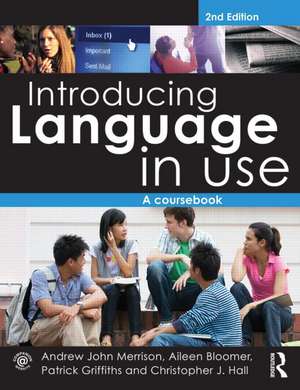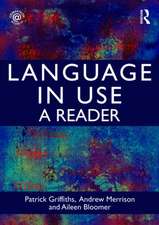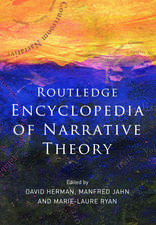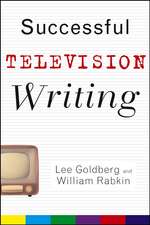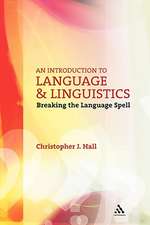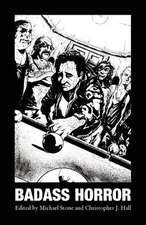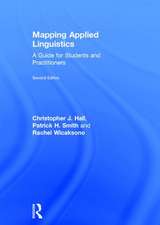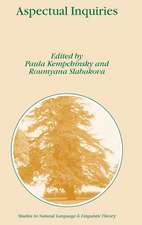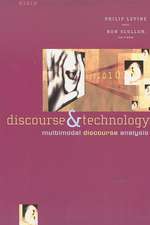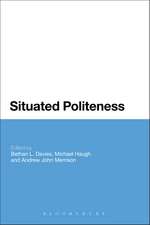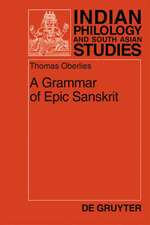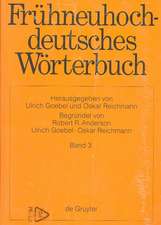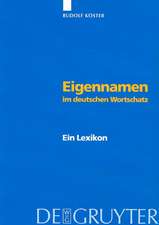Introducing Language in Use: A Course Book
Autor Andrew John Merrison, Aileen Bloomer, Patrick Griffiths, Christopher J. Hallen Limba Engleză Paperback – 12 dec 2013
The second edition of this best-selling textbook has been fully revised and updated with entirely new chapters on Phonology and Sociolinguistics, two separate chapters on syntax and grammar, completely rewritten chapters on Multilingualism, Psycholinguistics and World Englishes, and a greater focus on corpus linguistics.
Introducing Language in Use:
- covers all the core areas and topics of language study, including semiotics, communication, grammar, phonetics, phonology, words, semantics, variety in language, history of English, world Englishes, multilingualism, psycholinguistics, sociolinguistics, language acquisition, conversation analysis, pragmatics and politeness
- adopts a 'how to' approach, encouraging students to apply their knowledge as they learn it
- draws on examples of language from around the world in forms ranging from conversation to advertising and text messaging, always giving precedence to real language in use
- includes activities throughout the text and an extensive glossary of terms
This is an essential coursebook for all introductory courses in English language, communication and linguistics.
Visit the companion website at www.routledge.com/cw/merrison
| Toate formatele și edițiile | Preț | Express |
|---|---|---|
| Paperback (1) | 362.67 lei 22-36 zile | +44.69 lei 5-11 zile |
| Taylor & Francis – 12 dec 2013 | 362.67 lei 22-36 zile | +44.69 lei 5-11 zile |
| Hardback (1) | 780.16 lei 43-57 zile | |
| Taylor & Francis – 24 dec 2013 | 780.16 lei 43-57 zile |
Preț: 362.67 lei
Nou
Puncte Express: 544
Preț estimativ în valută:
69.40€ • 72.65$ • 57.42£
69.40€ • 72.65$ • 57.42£
Carte disponibilă
Livrare economică 17-31 martie
Livrare express 28 februarie-06 martie pentru 54.68 lei
Preluare comenzi: 021 569.72.76
Specificații
ISBN-13: 9780415583381
ISBN-10: 0415583381
Pagini: 488
Ilustrații: 13 colour illustrations, 14 black & white tables, 7 black & white halftones, 116 black & white line drawings
Dimensiuni: 189 x 246 x 25 mm
Greutate: 1.03 kg
Ediția:Revizuită
Editura: Taylor & Francis
Colecția Routledge
Locul publicării:Oxford, United Kingdom
ISBN-10: 0415583381
Pagini: 488
Ilustrații: 13 colour illustrations, 14 black & white tables, 7 black & white halftones, 116 black & white line drawings
Dimensiuni: 189 x 246 x 25 mm
Greutate: 1.03 kg
Ediția:Revizuită
Editura: Taylor & Francis
Colecția Routledge
Locul publicării:Oxford, United Kingdom
Public țintă
AS/A2 and UndergraduateCuprins
- Introduction: Read me! 1. Language, Communication and Semiotics 2. Conversation Analysis 3. Pragmatics 4. Power and Politeness 5. Words 6. Semantics 7. Syntax: Word to Clause 8. Grammar: Clause to Text 9. Phonetics I 10. Phonetics II 11. Phonology 12. Variety in Language 13. Sociolinguistics 14. Psycholinguistics 15. Language Acquisition 16. Multilingualism 17. History of English 18. World Englishes
Notă biografică
Andrew John Merrison is a senior lecturer in linguistics at York St John University. He has taught at the Universities of Durham, Edinburgh, York, and at Queen Margaret College, Edinburgh.
Aileen Bloomer is a Fellow in Linguistics at York St John University. She has also worked in Warwick, Germany, Vietnam and China.
Patrick Griffiths (1942-2012) was a professor of English at Beppu University Japan and had previously taught at the University of the South Pacific, the University of York (UK) and York St John University.
Christopher J. Hall is Reader in Applied Linguistics at York St John University. He taught previously at the University of the Americas in Puebla, Mexico.
Aileen Bloomer is a Fellow in Linguistics at York St John University. She has also worked in Warwick, Germany, Vietnam and China.
Patrick Griffiths (1942-2012) was a professor of English at Beppu University Japan and had previously taught at the University of the South Pacific, the University of York (UK) and York St John University.
Christopher J. Hall is Reader in Applied Linguistics at York St John University. He taught previously at the University of the Americas in Puebla, Mexico.
Recenzii
‘Across an extended range of topics and examples, this new edition builds on proven strengths of the first: it is accessible, up-to-date, and rich in exemplification and follow-up activities. What makes the new edition particularly useful as prescribed course reading is the easy movement it achieves from introductory concepts and description through to practical analysis of what the volume is then most eloquent about: language in use.’
Professor Alan Durant, Middlesex University, UK
‘Introducing Language in Use provides a comprehensive and practical introduction to the study of language and communication. It guides students in a step-by-step fashion into doing analyses of language at different levels: phonology, morphology, syntax, semantics and pragmatics. By using examples drawn from typologically different languages the authors present the rich diversity of structures found among human languages. Not only structural aspects are discussed, but also language acquisition and its use in different contexts and for different purposes. This second edition goes deeper than the first one by adding and updating several chapters and it can be recommended as course book to students of linguistics and English, as well as to anyone interested in human language.’
Professor Gisela Håkansson, Lund University, Sweden
‘Introducing Language in Use (2nd edition) is an ideal course book for students or anyone beginning to study linguistics and languages. It provides a comprehensive and thorough overview of the traditional core subjects of linguistics (phonetics/phonology, syntax and morphology) and describes recent developments in English and all its global variations. It also includes fascinating material on language and the mind.’
Dr Irina Moore, University of Wolverhampton, UK
‘This comprehensive introduction to the main topics in language study is an excellent addition to the field. The style is accessible, lively and engaging. Plenty of exercises and examples make is particularly useful for both teachers and general readers.’
Dr Elizabeth Holt, University of Huddersfield, UK
‘This book is perfect for teaching the basics of linguistics to undergraduate students on all types of English programmes, especially to classes where backgrounds can be very different. It covers all the main branches of linguistics and presents language as a behaviour that always occurs in a social context. It offers a wide range of examples and activities that students can perform in group as homework or when in class, thus helping to shape seminars around students’ questions and needs. The style is very student-friendly, constant cross-referencing and very detailed reminders and headers help students revise, and an interdisciplinary approach is always supported. It is much more than a text-book and a great teaching tool.’
Dr Arianna Maiorani, Loughborough University, UK
‘Introducing Language in Use is an intelligent, lively, well-paced and well -written textbook that will capture and hold students’ attention and challenge them with a battery of engaging questions and meaningful activities. Its tone is explanatory without being patronizing and it neither overdoes the jargon nor shies away from introducing technically more difficult concepts. It is good at incorporating external readings and supplementary information and balances easily on the tightrope between entertaining and educating. Thoroughly recommended for undergraduate students.’
Professor Barbara Fennell, University of Aberdeen, UK
‘Introducing Language in Use provides a comprehensive introduction to several core fields of linguistic enquiry. The inclusion of real-world examples, and the walk-through analyses which accompany them, make this text a practical introduction to language analysis, suitable not only for students of linguistics, but also for emerging clinicians who need to develop core knowledge of language and speech.’
Ms Colleen Holt, University of Melbourne, Australia
‘An enjoyable, accessible and up-to-date introduction to linguistics which moves away from orthodox prescriptions of ‘correct’ language use and digs into the complexities of human communication. The wealth of practical activities presented is essential for a thorough understanding of concepts and paradigms.’
Dr Eva Codó, Autonomous University of Barcelona, Spain
Professor Alan Durant, Middlesex University, UK
‘Introducing Language in Use provides a comprehensive and practical introduction to the study of language and communication. It guides students in a step-by-step fashion into doing analyses of language at different levels: phonology, morphology, syntax, semantics and pragmatics. By using examples drawn from typologically different languages the authors present the rich diversity of structures found among human languages. Not only structural aspects are discussed, but also language acquisition and its use in different contexts and for different purposes. This second edition goes deeper than the first one by adding and updating several chapters and it can be recommended as course book to students of linguistics and English, as well as to anyone interested in human language.’
Professor Gisela Håkansson, Lund University, Sweden
‘Introducing Language in Use (2nd edition) is an ideal course book for students or anyone beginning to study linguistics and languages. It provides a comprehensive and thorough overview of the traditional core subjects of linguistics (phonetics/phonology, syntax and morphology) and describes recent developments in English and all its global variations. It also includes fascinating material on language and the mind.’
Dr Irina Moore, University of Wolverhampton, UK
‘This comprehensive introduction to the main topics in language study is an excellent addition to the field. The style is accessible, lively and engaging. Plenty of exercises and examples make is particularly useful for both teachers and general readers.’
Dr Elizabeth Holt, University of Huddersfield, UK
‘This book is perfect for teaching the basics of linguistics to undergraduate students on all types of English programmes, especially to classes where backgrounds can be very different. It covers all the main branches of linguistics and presents language as a behaviour that always occurs in a social context. It offers a wide range of examples and activities that students can perform in group as homework or when in class, thus helping to shape seminars around students’ questions and needs. The style is very student-friendly, constant cross-referencing and very detailed reminders and headers help students revise, and an interdisciplinary approach is always supported. It is much more than a text-book and a great teaching tool.’
Dr Arianna Maiorani, Loughborough University, UK
‘Introducing Language in Use is an intelligent, lively, well-paced and well -written textbook that will capture and hold students’ attention and challenge them with a battery of engaging questions and meaningful activities. Its tone is explanatory without being patronizing and it neither overdoes the jargon nor shies away from introducing technically more difficult concepts. It is good at incorporating external readings and supplementary information and balances easily on the tightrope between entertaining and educating. Thoroughly recommended for undergraduate students.’
Professor Barbara Fennell, University of Aberdeen, UK
‘Introducing Language in Use provides a comprehensive introduction to several core fields of linguistic enquiry. The inclusion of real-world examples, and the walk-through analyses which accompany them, make this text a practical introduction to language analysis, suitable not only for students of linguistics, but also for emerging clinicians who need to develop core knowledge of language and speech.’
Ms Colleen Holt, University of Melbourne, Australia
‘An enjoyable, accessible and up-to-date introduction to linguistics which moves away from orthodox prescriptions of ‘correct’ language use and digs into the complexities of human communication. The wealth of practical activities presented is essential for a thorough understanding of concepts and paradigms.’
Dr Eva Codó, Autonomous University of Barcelona, Spain
Descriere
Introducing Language in Use, second edition, provides a lively and accessible introduction to the study of language and linguistics. Drawing on a vast range of data and examples of language in its many forms, this book provides students with the tools they need to analyse real language in diverse contexts.
